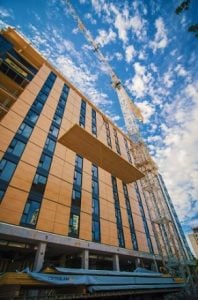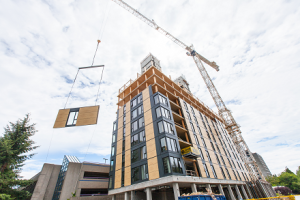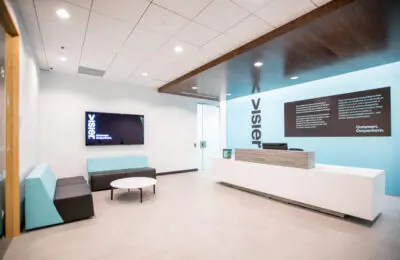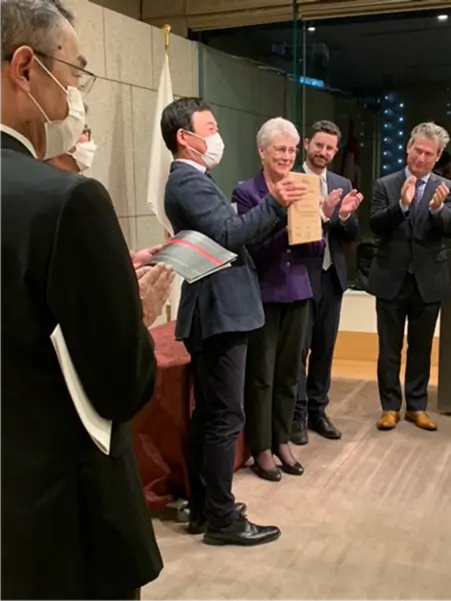There’s Natural Strength in B.C.’s Mass Timber Sector
British Columbia (B.C.), Canada, is a hotspot for sustainable construction and innovative building practices, particularly in the realm of mass timber construction.
The growing global emphasis on sustainable building practices has created significant demand for green construction materials like mass timber. Projects constructed with mass timber can reduce a building’s carbon footprint compared to traditional concrete and steel construction. Mass timber buildings not only have a calming effect, but they also have proven excellent performance in seismic events, making them a reliable choice for construction in earthquake-prone regions. Consequently, architects, developers and builders around the world are seeking sustainable alternatives, presenting many opportunities for international investors to participate in B.C.’s mass timber supply chain.

- Construction of Brock Commons (bottom view) Photographer: KK Law, courtesy naturallywood.com
Below are a few reasons why B.C. is an attractive destination for those looking to contribute to the growth of the province’s mass timber sector.
B.C. has an abundance of natural resources
One of the primary reasons why B.C. is an ideal location for mass timber investments is its abundant natural resources. B.C.’s vast forests, which include spruce, pine and fir, are highly sought-after for mass timber construction.
B.C. has supportive government policies
The Government of British Columbia is actively promoting the use of sustainable building materials and mass timber construction as part of the transition from high volume to high value production forestry.
Several initiatives and incentives have been put in place stemming from the Mass Timber Action Plan and the StrongerBC Economic Plan to encourage investments in the mass timber sector. For example, the Manufacturing Jobs Fund helps manufacturing companies modernize, innovate and grow by providing funding for capital projects in all regions of B.C., with a focus on helping the forestry sector retrofit and develop new, sustainable value-added business lines. Such supportive policies create a favourable investment climate for domestic and international investors interested in contributing to significantly reducing greenhouse gas emissions from construction. Additionally, B.C. recently announced $3.3 million dollars in funding over three years to create a mass timber training hub at the British Columbia Institute of Technology. This training hub will help ensure that B.C. has skilled workers for jobs of the future — manufacturing mass timber and designing and building low carbon mass timber buildings.
B.C. is at the forefront of innovation
B.C. is a leader in innovative mass timber technology and construction techniques. There are more mass timber buildings per capita than any other place in North America. Innovations such as cross-laminated timber (CLT) and dowel-laminated timber have revolutionized the building industry, allowing for taller, safer and more efficient structures. B.C.’s 18-storey Brock Commons Tallwood House was the tallest mass timber building in the world when it opened in 2017. To help further expand the use of mass timber in B.C.’s construction sector, the Government of British Columbia, through the Forestry Innovation Investment, is investing more than $9 million for 28 new mass-timber demonstration and research projects.

- Construction of Brock Commons (side view). Photographer: KK Law, courtesy naturallywood.com
As a leader in sustainable construction and mass timber technology, B.C. offers lucrative opportunities for international investors looking to fill the growing demand for eco-friendly building materials. Abundant natural resources, supportive government policies, advancements in mass timber technology and export potential make B.C. an attractive destination for investments in the mass timber industry.
To learn more about the natural strength of B.C.’s mass timber sector, follow Trade and Invest BC on LinkedIn and X, or contact our trade and investment experts.
Related News
We Can Help
Trade and Invest BC helps facilitate foreign direct investment and has Trade and Investment Representatives in markets around the world. Contact the representative nearest you for support in investing in British Columbia.





